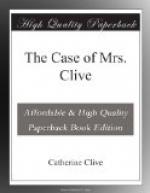From the mid-thirties until 1743, Mrs. Clive appears in roles she had made famous as well as those newly written with her particular talents in mind. Fielding, turning more and more to political satire and soon to another literary form, had little need of her services;[12] but others did, and the years between the licensing act and 1743 find Mrs. Clive in demand as the affected lady of quality, speaker of humorous epilogues, performer in Dublin, and singer of such favorites as “Ellen-a-Roon,” “The Cuckoo,” and “The Life of a Beau.” This period is also marked by Mrs. Clive’s first professional venture with David Garrick, in his Lethe, the beginning of a relationship to become one of the most tempestuous and fruitful in all theater history.
As I intimated at the outset, the licensing act mainly troubled the London players because of the power of monopoly it invested in Fleetwood and Rich. Not only were the forums for dramatic presentation now restricted, but so was professional freedom. The problem, therefore, was as much philosophical as it was geographical. From the sixteenth century to 1737, English players had some freedom (albeit limited) to rebel from intolerable authority and to form their own company.[13] This freedom, this choice, as Lord Chesterfield pointed out in his speech against the act, was severely attenuated in 1737, and was to remain so in varying degrees until the monopoly the act allowed was legislated dead in 1843. But it was a cartel between the managers that the players most feared, and there is evidence in the pamphlets growing out of the struggle of 1743 that such a fear was well-founded.
The playing conditions at Drury Lane in the early forties were not good, a situation directly attributable to the ineptitude and highhandedness of Fleetwood (and his treasurer Pierson) and his refusal to pay salaries in full and on time. The manager’s accommodating side-show performers in his company did not help. Macklin, as Fleetwood’s lieutenant, had to try to pacify actors, workmen, creditors; as actor he commiserated with the players. With the coming of Garrick from Goodman’s Fields to Drury Lane late in the 1741-1742 season and with a progressively disgruntled Clive all the principals in the revolt are under one—leaky—roof.
In light of the number and variety of the published commentary which accompanied the revolt, perhaps a highlighting of Clive’s Case would be the most efficient way to elucidate some of the major difficulties involved. After addressing herself to “the Favour of the Publick,” with encouragement from her friends,[14] Mrs. Clive strikes the key note of her essay: injustice and oppression, specifically seen in the cartel’s threat to “Custom,” an iterative word throughout the essay. Mrs. Clive first speaks of salary, a matter obviously important to her “Liberty and Livelihood."[15] One writer on the dispute, in a quasi-satirical tract, denounces the managers in this regard and in so doing echoes




